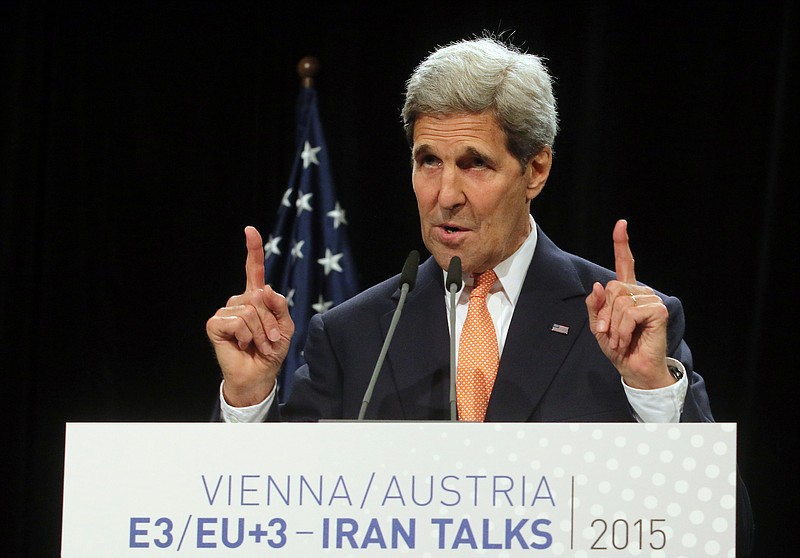Somebody's fibbing
The White House should get its stories straight on the four hostages being held in Iran.
President Barack Obama, answering a question by CBS News Chief White House Correspondent Major Garrett last week, said negotiators intentionally did not tie the release of the hostages to the Middle East country's nuclear program.
"Think about the logic that that creates," the president said. "Suddenly, Iran realizes, you know what, maybe we can get additional concessions out of the Americans by holding these individuals - makes it much more difficult for us to walk away if Iran somehow thinks that a nuclear deal is dependent in some fashion on the nuclear deal. And by the way, if we had walked away from the nuclear deal, we'd still be pushing them just as hard to get these folks out. That's why those issues are not connected, but we are working every single day to try to get them out and won't stop until they're out and rejoined with their families."
Secretary of State John Kerry, apparently not on the same page with the president, said on MSNBC's "Morning Joe" there was "not one meeting that took place" during the talks at which the United States did not raise the issue of the hostages. In fact, he said, it even was raised at the last meeting with Iranian officials before the deal was announced.
How'd that work out?
Twenty-one years ago, as it did last week, the national media was crooning its praise for a nuclear deal made under the auspices of a brilliant Democratic president.
The 1994 deal with North Korea, to which President Bill Clinton agreed, was said to have been made to curb the Asian country's desire to build a nuclear weapon. In return for international access to its nuclear facilities (which was negotiated at the time to be delayed for five years), the U.S. would help the Communist nation build a new nuclear reactor that would not be capable of producing weapons-grade plutonium.
The president, at the time, hailed the agreement as a sign that "the Cold War is really over." ABC News anchor Peter Jennings gushed that the deal "will prevent North Korea from developing a nuclear weapon."
So what, in fact, happened?
North Korea, apparently, already had one bomb, and the country is estimated to have between 12 and 27 today, claims to have the technology to "miniaturize nuclear weapons" and has no diplomatic relations with the U.S.
Last week's agreement with Iran is far more generous to the country seeking to build a bomb, affects a much more strategic area than North Korea and has stipulations that are no more likely to be met than in the one signed in 1994.
Hardly grassroots
The campaign team of Democratic presidential candidate Hillary Clinton, in an effort to fend off embarrassment at being outraised recently by Republican presidential candidate Jeb Bush, sent an email to donors in the last several weeks, noting that her campaign is running "a different kind of race" from the political action committee money-heavy Bush campaign.
"More than 250,000 people have chipped in $1, $5, or $10," the email said, "because they care enough about this election to have a financial stake in it."
Not so fast, media outlets reported. If each of those people gave separate donations of $1, $5 and $10, that would be $16 apiece, for a total of $4 million. That leaves $42 million of her $46.7 million unaccounted for. The Washington Post reported only 17 percent of her total, or $7 million, came from donations of $200 or less. Which leaves about $39 million that came from the same type of high-dollar donors that apparently gave to Bush's campaign.
In sum, it's hardly a campaign financed by the little people.
Just a 'little' murder
An Illinois congressmen dismissed the recent murder of Kate Steinle by an illegal immigrant in San Francisco as a "little thing" recently on Spanish-language network Telemundo.
Addressing concerns that 62 percent of Americans believe the Department of Justice should take legal action against sanctuary city policies, where officials look the other way at or even protect illegal immigrants, U.S. Rep. Luis Gutierrez, D-Ill., said, "Every time a little thing like this happens, [opponents of illegal immigration] use the most extreme example to say it must be eliminated."
Murder? Well, it is a bit extreme.
A Rassmussen Reports survey indicates the feelings over sanctuary cities are hardly partisan. While 79 percent of Republicans believe sanctuary cities should lose federal funds, 61 percent of unaffiliated voters also believe it, along with a healthy 46 percent of Democrats. Similarly, in a question as to whether the U.S. Justice Department should take action against sanctuary cities, 79 percent of Republicans, 65 percent of unaffiliated voters and 43 percent of Democrats said it should.
